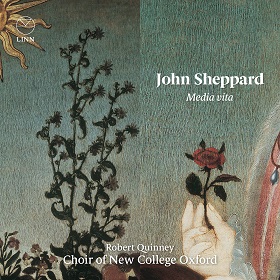Modern scholarship directed at the English Reformation composer John Sheppard (c.1515-58) has come a long way since Peter le Huray’s research during the 1960s and David Wulstan’s pioneering performances a decade later. A growing number of recordings over the last thirty years by specialist groups and a handful of cathedral choirs has gradually revived the fortunes of this still comparatively neglected composer whose career traversed successive reigns of four Tudor monarchs with their consequent religious and musical upheavals. Of seven Latin motets written during Mary Tudor’s reign (1553-58) and presented here, four are premiere recordings.
Regardless of the fascinating historical arguments Robert Quinney makes for the original performances of these motets, the music divides into two distinct groups; motets based on plainchant – cantus firmus pieces – and those that are freely imitative. By far the most substantial work is the monumental Media vita, Sheppard’s crowning achievement and one clearly demonstrating a mind attuned to musical architecture in its contrasting sonorities, cumulative drama and structural integrity. This performance (24 minutes plus) joins an already diverse group of recordings since the Tallis Scholars outlined its glories in 1989. Neither indulgent nor indecently hurried, Quinney opts for a spacious unfolding that comes midway between that of The Gabrieli Consort (Deutsche Grammophon, 2007), at just over nineteen minutes, and Westminster Cathedral Choir (Hyperion, 2017) at a little under 30 minutes.

Quinney also allows for the work’s expressive power to register fully; individual phrases are cherished, with extended paragraphs evolving with great solemnity as if the obsequies for Sheppard’s fellow composer Nicholas Ludford (for which this work was supposedly conceived) were being faithfully reimagined. Both the recording venue (St Michael’s Church, Summerton, Oxford) and Linn’s engineers ensure clarity of sound; and the transparency of Media vita’s six-part textures entrance the ear. It may be my fancy, but there’s something affecting in the way the men’s voices seem to darken their tone at ‘Cast us not away in the time of old age’ with just a hint of resignation in each entreaty. In general, the New College Choir respond to this meditation on death (so pertinent to the coronavirus pandemic) with full blooded commitment; boys’ voices soaring into nave vaulting and all voices whole heartedly (no more so than exuberant tenors) urging a merciful God ‘to deliver us not to death’ in the third of the repeated ‘Sancte fortis’ pleas.
There’s a similarly well-nourished tone to the five-part Confitebor tibi, a motet no less opulent in imitative detail than Media vita but rampant with false relations that will have you beating a path to Stainer & Bell for Magnus Williamson’s edition. A fitting sense of jubilation here; choristers and men treasuring every sensuous vocal twist, and if its euphoria feels relentless, the text provides limited opportunities for a more yielding delivery. A pliant quality is also largely absent from the predominantly syllabic Sacris solemniis, where Sheppard’s rich eight-part passages elicit a rather starch-laden last supper. The Christmas hymn A solis ortus cardine draws singing of blazing intensity, its nativity scene generously projected and evoking, for this listener, Michelangelo’s muscular portrayal of the Holy Family (Doni Tondo). With the choir’s ‘up and at ’em’ approach, this is no fragile new-born but a fully-fledged child in startlingly rude health.
The three psalm texts are similarly sung with full throated conviction and if the unvarying sonorities of Iudica me Deus (Psalm 43) nearly outstay their welcome, there’s no gainsaying the text’s powerful resonances, with its petitions for deliverance from an ungodly people, for a recently enthroned Catholic monarch. Appeals for clemency are expressed with forthright zeal in Inclina Domine (Psalm 86) and a comparable verve informs Deus misereatur (Psalm 67), its flowing contours (singularly apparent in this motet) perhaps taking inspiration from the Maundy Thursday practice of feet washing – a ceremony faithfully observed by Queen Mary – implicit in the opening plainsong text.
Robert Quinney and his New College Choir are to be applauded for these authoritative performances that take one further step in illuminating the work of a once overlooked composer brought here vividly to life.
David Truslove
The Choir of New College, Oxford; Robert Quinney (director)
A solis ortus cardine, Inclina Domine, Iudica me Deus, Deus misereatur, Confiteor tibi, Sacris solemniis, Media vita
Linn CKD 632 [71:58]